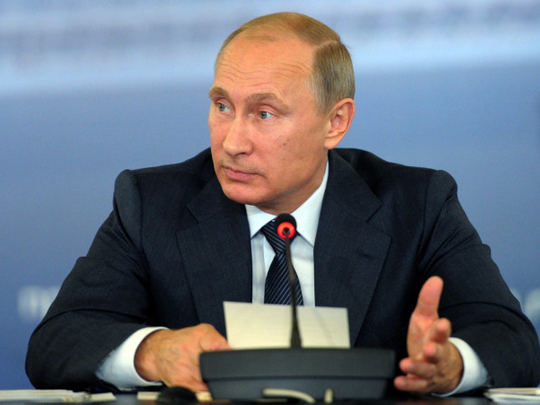
Given Russian President Vladimir Putin’s anti-western stance and his record of stamping out domestic opposition, it would be logical to suppose his backers are trying to ban foreign ownership of Russian media to silence the few independent news outlets that still operate in Moscow, such as the Russian edition of Forbes magazine and the daily Vedomosti, a joint venture of Dow Jones and Britain-based Pearson, publisher of the Financial Times.
It may well be, however, that the measure is aimed at least in part at Russia’s glossy magazines, which are — perhaps inadvertently — providing Russians with too much of an insight into the private lives of powerful bureaucrats.
On September 11, the Russian edition of Tatler magazine, owned by New York-based Conde Nast, ran a feature based on an interview with Yekaterina Peskova, the ex-wife of Putin’s influential press secretary, Dmitry Peskov. Illustrated with glamorous photographs of the youthful blonde who now lives a socialite’s life on Avenue Foche in Paris, it talks of her expensive tastes and the posh French school that Peskov’s daughter attended, but also of her regrets about the failed marriage. “Two years ago the Peskov marriage slipped on the treacherous Olympic ice,” is how the Tatler writer describes the Kremlin spokesman’s rumoured affair with figure skater Tatyana Navka, never mentioning her by name.
Peskov has worked for the government throughout his career, and his wife admits she is “no businesswoman.” This makes the family wealth hard to explain. Also, the tale of Peskov’s betrayal (“I thought Dima was different,” the ex-wife told Tatler) contrasts with Putin’s preaching of traditional moral values. No wonder the Tatler story became a viral hit.
Less than a week later, on September 17, a group of pro-Putin, Communist and nationalist legislators introduced a bill limiting foreign ownership of Russian media outlets to 20 per cent. It would force the sale or closure of Vedomosti and Forbes Russia, but also of the Russian editions of Tatler, Cosmopolitan, Vogue, Harper’s Bazaar and dozens of other magazines.
One might wonder why the glossies were lumped together with publications covering business and politics: Weren’t they non-combatants in any real or imagined information wars? To one of the drafters, nationalist Vadim Dengin, that’s a naive suggestion: “The glossies, which talk of healthy bodies, carry pictures from drunken parties, feature expensive watches and cars, and publish funny stories that have curse words in them, are beginning to insert political articles,” he told a parliamentary hearing. He did not cite any examples, but the Peskova story comes to mind.
“It didn’t occur to the editors that before airing the dirty linen of Vladimir Putin’s press secretary, they should have asked the presidential administration for advice,” Anton Nosik, who founded several internet publications in Moscow, said in a public lecture. If this was possible, he explained, no Kremlin regular’s private life was immune from unhealthy attention: “Tatler is now a bigger irritant than Vedomosti.”
Parallel to the foreign ownership bill’s swift passage though parliament, a campaign of sorts unfolded against the glossies. Another Tatler piece, in which a metals magnate’s daughter discoursed snobbishly on the best ways to handle servants, was seeded on the social networks, causing widespread indignation that was only fuelled by the author’s insincere apology and Tatler’s exasperating explanation that it was a niche publication not meant for the masses.
Then, the government-owned daily Rossiyskaya Gazeta published an opinion piece written in the style of the character assassinations once common in Pravda, the Soviet Communist Party’s main newspaper. It took issue with the glossies as unpatriotic mouthpieces for a westernised lifestyle. “Fashion magazines have a big audience, including an internet one, that is predominantly young,” it went. “They create new heroes of the kind western advertisers approve, those who are willing to strictly follow fashion. The question is, fashion for what?”
One doesn’t need to be finely attuned to the methods of Putin-era propaganda to see that the Kremlin is not happy with the glossies for one reason or another. The foreign ownership ban, which received final approval from the parliament’s upper house on October 1 and now awaits Putin’s signature, targets them as much as any other “unpatriotic” media outlets.
Tatler, for its part, goes blithely on. On September 25, it published a revealing interview with the young wife of former Kremlin business manager Vladimir Kozhin, and on October 6 added a photo shoot of the family of Vladislav Surkov, the Putin aide who serves as an intermediary between Moscow and Ukraine’s separatist rebels. The ostensibly glamorous pictures feel as though a satirist photoshopped them to look like installations at Madame Tussauds.
Russia has no elite left except for Putin’s inner circle of bureaucrats and government-contract billionaires. What can a glossy magazine publisher do except glamorise their wives and girlfriends? That, however, won’t do in a country at war. I expect Putin to sign the bill.
— Washington Post
Bloomberg View contributor Leonid Bershidsky is a Berlin-based writer, author of three novels and two nonfiction books.








